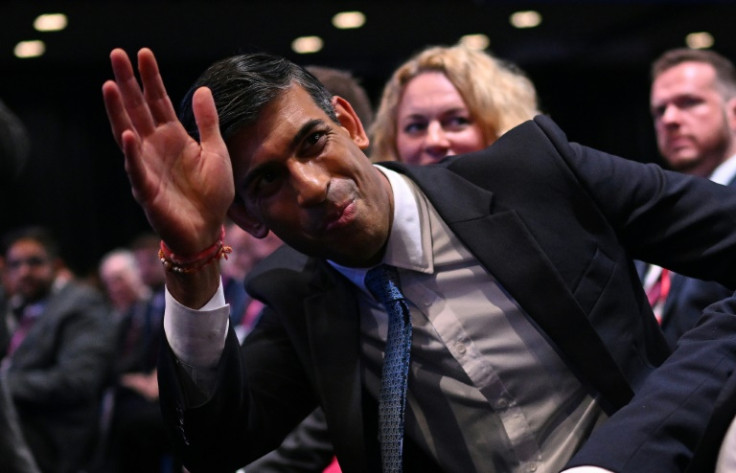General Election "Not What the Country Wants" Says Rishi Sunak
Batting away concerns about his authority, Sunak insisted he was "just getting on" with the job and "delivering" on his long-term policy plans.

Rishi Sunak has claimed a general election is "not what the country wants" as he faces the media following the Conservative Party conference in Manchester this week.
The Prime Minister was responding to questioning from Sky's Beth Rigby, who pronounced him as a "man without a mandate".
The former Chancellor, who lost the Tory leadership election to Liz Truss last year, was appointed Prime Minister weeks later, without a vote from members.
Batting away concerns about his authority, Sunak insisted he was "just getting on" with the job and "delivering" on his long-term policy plans.
And when asked if he would still be prime minister after the next election, he replied: "Of course".
Britain's ruling Conservatives opened their annual conference Sunday, with the party's chairman conceding they were "the underdogs" heading into a general election expected next year amid widespread economic woes.
Last week, The Bank of England held interest rates at 5.25 per cent after a close-running vote opted against a 15th increase in a row.
Interest rates have been rising consistently since 2021, in an attempt to combat inflation, and are currently at their highest level for 15 years.
Sunak promised at the start of the year that he would "halve inflation"; it would have to fall to about 5.3 per cent in December to meet that target.
In March, he unveiled a budget aimed at tackling a cost-of-living crisis — which has sparked strikes as many wages fail to keep pace.
The past year, soaring prices have caused a cost-of-living crisis to run rampant across the UK, with rising food and energy bills contributing to record-breaking inflation levels.
The dire situation has allowed the main Labour opposition, which starts its yearly conference in Liverpool this Sunday, to open up double-digit poll leads and ready itself for a potential return to government.
However, several recent opinion polls have shown the race with Labour tightening from the wide margins seen earlier this year – to as little as 10 percentage points in a one-weekend survey.
In an attempt to further narrow Labour's lead, Sunak has been on the offensive the past few weeks, making numerous policy announcements and controversial decisions.
The Prime Minister has also faced intense pressure to clarify his plans for HS2, a planned high-speed railway line in England, which would run between Manchester and London with branches to Birmingham and the East Midlands.
Rumours surfaced that Sunak intended to scrap the Northern Leg of HS2, instead opting to reinvest the money the government would have to spend on the northern leg - about £36 billion - in the Midlands and the north.
It is suggested the prime minister believes the rationale for HS2 is based on "old assumptions" with internal estimates suggesting that the cost of the project has ballooned from £30 billion when it was first announced to more than £100 billion.
However, The move has been opposed by a succession of senior Tories, including three former prime ministers — Boris Johnson, Theresa May and David Cameron. They have raised concerns that it will undermine the party's commitment to levelling up, with Johnson describing the plans as "insanity".
In his interview with Rigby, Sunak declined to say whether he had made up his mind, instead dismissing "speculation" and adding: "I approach all these things carefully, thoughtfully, rigorously."
Despite this, It is expected he will announce the cancellation of HS2 in his conference speech tomorrow.
As we enter the final day of the Conservative Party conference, the biggest announcement so far has been the increase of the national living wage to £11 per hour – meaning full-time workers will see their annual earnings rise by at least £1,000 next year.
Chancellor Jeremy Hunt told a room of card-carrying Conservatives: "Today I want to complete another great Conservative reform, the national living wage."
"We promised in our manifesto to raise the national living wage to two-thirds of median income - ending low pay in this country."
The national living wage – as it has been officially called since 2016 – is the lowest amount workers aged 23 and over can be paid per hour by law, and is currently £10.42 an hour. There are lower rates for younger workers.
© Copyright IBTimes 2025. All rights reserved.






















